The recent developments in Bangladesh, marked by the departure of Prime Minister Sheikh Hasina and the dissolution of Parliament by President Mohammed Shahabuddin, have raised significant concerns about the nation’s future. Exiled author Taslima Nasreen’s stark predictions of an impending takeover by religious extremists highlight the precarious situation facing Bangladesh, especially for those who do not adhere to Islam.
If Jamaat-e-Islami or other extremist factions come to power, the consequences could be severe. Sharia law may be implemented, leading to a drastic erosion of women’s rights and freedom of expression. The non-Muslim population, including Hindus, Christians, and Buddhists, could face increased persecution, forced conversions, and reduced civil liberties. The secular fabric of Bangladesh, which has been fraying for years, might unravel completely, pushing the country toward an autocratic, theocratic state.
For India, these developments in Bangladesh are alarming. As a neighboring country with a shared history and cultural ties, the instability in Bangladesh could spill over, leading to an influx of refugees and increased communal tensions within India. Additionally, the rise of extremism in Bangladesh could embolden similar elements within India, threatening the country’s secular and democratic values.
To prevent such a scenario, the Indian government must adopt a multifaceted approach. Firstly, it should strengthen its diplomatic efforts to support secular and democratic forces in Bangladesh, possibly through regional platforms like SAARC. Secondly, India must bolster its border security to manage any potential refugee crisis and prevent cross-border terrorism. Domestically, the Indian government should reinforce its commitment to secularism by ensuring that all citizens, regardless of their religion, are treated equally under the law. Educational reforms promoting tolerance and understanding among different communities could also play a crucial role in countering radical ideologies.
India’s rich history of pluralism and diversity must be preserved at all costs, serving as a bulwark against the spread of extremism in the region. By proactively addressing these issues, India can safeguard its own secular fabric while contributing to stability in South Asia.























